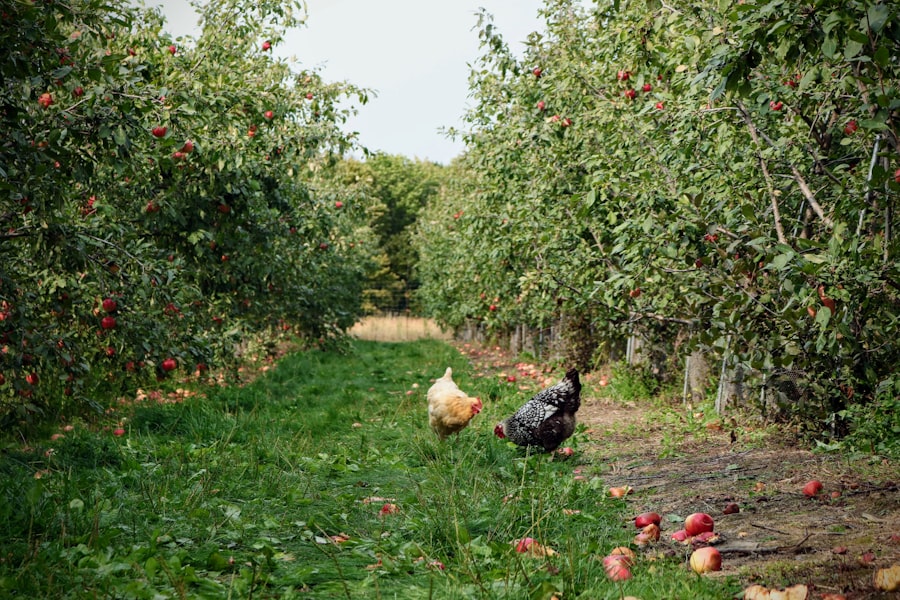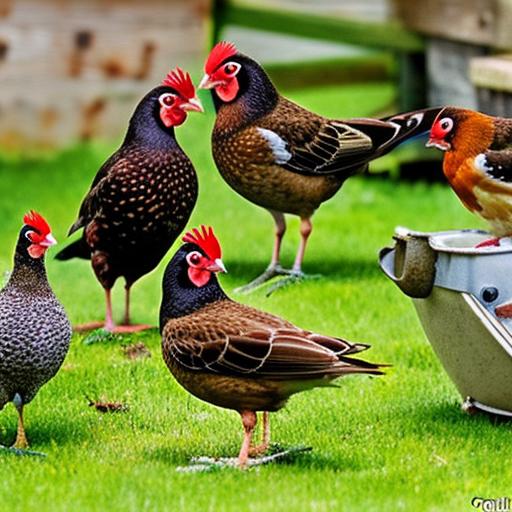Keeping chickens in your back garden has become a growing trend in recent years. More and more people are realizing the benefits of having their own flock of chickens, whether it’s for fresh eggs, natural pest control, or simply as pets. In this article, we will explore the various benefits of keeping chickens in your back garden, as well as the legal considerations, zoning laws, health and safety concerns, and tips for choosing and maintaining a chicken coop. By the end of this article, you will have a better understanding of whether keeping chickens in your back garden is right for you.
Key Takeaways
- Keeping chickens in your back garden can provide fresh eggs and fertilizer
- Legal considerations include checking local zoning laws and regulations
- Health and safety concerns for chickens and humans should be taken seriously
- Choosing the right chicken coop and maintaining it is important for the well-being of the chickens
- Feeding and caring for backyard chickens requires time and effort, but can be rewarding
Benefits of keeping chickens in your back garden
One of the main benefits of keeping chickens in your back garden is having fresh eggs daily. There is nothing quite like collecting eggs from your own flock and enjoying them for breakfast. Not only are fresh eggs delicious, but they are also more nutritious than store-bought eggs. They contain higher levels of vitamins A, E, and D, as well as omega-3 fatty acids.
Another benefit of having chickens in your back garden is natural pest control. Chickens love to eat insects, slugs, and other pests that can damage your garden. They will happily scratch and peck at the ground, devouring any pests they come across. This can help reduce the need for chemical pesticides and keep your garden healthy and pest-free.
In addition to providing fresh eggs and natural pest control, chickens can also make great pets. They have unique personalities and can be quite entertaining to watch. Many people find that spending time with their chickens is a great way to relax and de-stress. Chickens are also relatively low-maintenance pets compared to dogs or cats, making them a popular choice for those who want the companionship of animals without the added responsibility.
Legal considerations for keeping chickens in your back garden
Before you decide to keep chickens in your back garden, it’s important to check the legality of doing so in your area. Some cities or neighborhoods have specific regulations or restrictions on keeping chickens. These regulations may include the number of chickens you can keep, the size and location of the coop, and any permits or licenses required.
To find out the specific regulations in your area, you can contact your local government or animal control department. They will be able to provide you with information on any zoning laws or regulations that may affect your ability to keep chickens. It’s important to follow these regulations to avoid any fines or penalties.
Local zoning laws and regulations
In addition to checking the legality of keeping chickens in your area, you should also be aware of any local zoning laws or regulations that may affect your ability to keep chickens. Zoning laws are put in place to regulate land use and ensure that certain activities are compatible with the surrounding area.
Some areas may have restrictions on the number of chickens you can keep, the size and location of the coop, and even the distance between the coop and neighboring properties. It’s important to familiarize yourself with these regulations before you start keeping chickens in your back garden.
Health and safety concerns for chickens and humans
When keeping chickens in your back garden, it’s important to prioritize their health and safety. This includes providing them with a clean and comfortable living environment, regular veterinary care, and a balanced diet.
Keeping your chicken coop clean is essential for preventing the spread of diseases and parasites. Regularly cleaning out the coop, removing soiled bedding, and disinfecting surfaces can help keep your chickens healthy. It’s also important to provide them with fresh water and a balanced diet that includes a mix of grains, vegetables, and protein.
While chickens themselves are generally not a health risk to humans, it’s important to practice good hygiene when handling them. Wash your hands thoroughly after handling chickens or their eggs, and avoid touching your face or mouth while in the coop. It’s also a good idea to keep children and pets away from the coop to prevent any potential accidents or injuries.
Choosing the right chicken coop for your back garden

Choosing the right chicken coop is crucial for the health and well-being of your flock. There are several different types of chicken coops available, including traditional wooden coops, mobile coops, and even DIY options.
When choosing a chicken coop, it’s important to consider the size and number of chickens you plan to keep, as well as your climate. The coop should provide enough space for each chicken to move around comfortably and have access to nesting boxes and perches. It should also be well-ventilated and provide protection from predators.
If you live in an area with extreme weather conditions, such as hot summers or cold winters, you may need to choose a coop that is specifically designed for your climate. This may include features such as insulation, ventilation, or heating elements to keep your chickens comfortable year-round.
Building or buying a chicken coop
When it comes to building or buying a chicken coop, there are pros and cons to consider. Building your own coop allows you to customize it to your specific needs and preferences. You can choose the size, design, and materials that best suit your backyard and flock. Building a coop can also be a fun and rewarding DIY project.
However, building a coop from scratch can be time-consuming and require some basic carpentry skills. It may also be more expensive than buying a pre-made coop, especially if you need to purchase tools or materials. If you decide to build your own coop, make sure to do thorough research and follow plans or instructions from reliable sources.
On the other hand, buying a pre-made coop can be a convenient option for those who don’t have the time or skills to build their own. There are many options available online and in stores, ranging from basic to elaborate designs. When buying a pre-made coop, make sure to choose one that is well-built and meets your specific needs in terms of size, ventilation, and predator protection.
Maintaining a clean and healthy chicken coop
Maintaining a clean and healthy chicken coop is essential for the well-being of your flock. A dirty or poorly maintained coop can lead to the spread of diseases and parasites, as well as unpleasant odors.
To keep your coop clean, it’s important to regularly remove soiled bedding, droppings, and any leftover food. This can be done by using a rake or shovel to scoop out the waste and then adding fresh bedding. It’s also a good idea to regularly disinfect surfaces with a poultry-safe disinfectant to kill any bacteria or parasites.
In addition to regular cleaning, it’s important to provide your chickens with fresh water and a balanced diet. Make sure to check their water supply daily and clean or replace it as needed. Provide them with a mix of grains, vegetables, and protein to ensure they are getting all the nutrients they need.
Feeding and caring for your backyard chickens
Feeding and caring for your backyard chickens is an important part of keeping them healthy and happy. Chickens require a balanced diet that includes a mix of grains, vegetables, and protein.
A good quality chicken feed should be the main component of their diet. Look for a feed that is specifically formulated for laying hens, as this will provide them with the necessary nutrients for egg production. You can also supplement their diet with kitchen scraps, such as fruits, vegetables, and grains.
In addition to providing them with a balanced diet, it’s important to provide your chickens with fresh water at all times. Chickens can drink a surprising amount of water, especially during hot weather or when laying eggs. Make sure to check their water supply daily and clean or replace it as needed.
Caring for your chickens also includes regular health checks and veterinary care. Keep an eye out for any signs of illness or injury, such as changes in behavior, loss of appetite, or abnormal droppings. If you notice any concerns, it’s important to consult a veterinarian who specializes in poultry.
Is keeping chickens in your back garden right for you?
In conclusion, keeping chickens in your back garden can be a rewarding and enjoyable experience. The benefits of having fresh eggs, natural pest control, and pets are hard to ignore. However, it’s important to consider the legal considerations, zoning laws, health and safety concerns, and the responsibilities that come with keeping chickens.
Before you decide to keep chickens in your back garden, make sure to check the legality of doing so in your area and familiarize yourself with any zoning laws or regulations that may affect your ability to keep chickens. It’s also important to prioritize the health and safety of your chickens by providing them with a clean and comfortable living environment, regular veterinary care, and a balanced diet.
Ultimately, whether keeping chickens in your back garden is right for you will depend on your personal circumstances and preferences. If you have the time, space, and resources to properly care for a flock of chickens, it can be a rewarding and fulfilling experience. However, if you are not able to meet the needs of chickens or if it is not allowed in your area, there are still other ways to enjoy the benefits of fresh eggs and natural pest control, such as supporting local farmers or community gardens.
If you’re considering keeping chickens in your back garden, you may also be interested in learning about the ideal chicken coop setup. The Chicken Coop Country Diner is a fantastic resource that provides valuable insights into creating a comfortable and functional coop for your feathered friends. From choosing the right size to understanding the importance of ventilation and nesting boxes, this article covers all the essential aspects of building a coop that meets your chickens’ needs. Check out The Chicken Coop Country Diner for expert advice on creating a cozy home for your backyard flock.
FAQs
What are the laws regarding keeping chickens in a back garden?
The laws regarding keeping chickens in a back garden vary depending on the country and local council regulations. In some areas, there may be restrictions on the number of chickens you can keep, the size of your garden, and the distance between your coop and your neighbor’s property.
Do I need a permit to keep chickens in my back garden?
In some areas, you may need a permit to keep chickens in your back garden. It is important to check with your local council to see if there are any regulations or permits required before keeping chickens.
What are the benefits of keeping chickens in a back garden?
Keeping chickens in a back garden can provide a source of fresh eggs, natural pest control, and fertilizer for your garden. Chickens can also be great pets and provide entertainment for the whole family.
What are the potential drawbacks of keeping chickens in a back garden?
Some potential drawbacks of keeping chickens in a back garden include noise, odor, and the potential for attracting predators. It is important to properly care for and maintain your chicken coop to minimize these issues.
What do I need to consider before keeping chickens in my back garden?
Before keeping chickens in your back garden, you should consider the size of your garden, the number of chickens you want to keep, the type of coop you will need, and the potential impact on your neighbors. It is also important to research the care and maintenance required for chickens.
Meet Walter, the feathered-friend fanatic of Florida! Nestled in the sunshine state, Walter struts through life with his feathered companions, clucking his way to happiness. With a coop that’s fancier than a five-star hotel, he’s the Don Juan of the chicken world. When he’s not teaching his hens to do the cha-cha, you’ll find him in a heated debate with his prized rooster, Sir Clucks-a-Lot. Walter’s poultry passion is no yolk; he’s the sunny-side-up guy you never knew you needed in your flock of friends!







